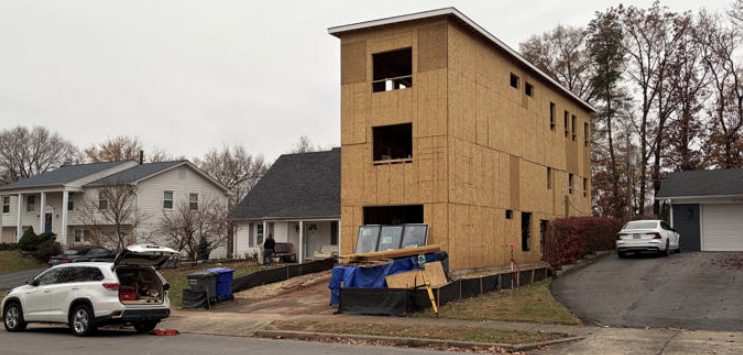Higher urban housing density is being promoted by the City of Lakewood, Colorado as a strategy to improve affordability by increasing the supply of housing units in a given area, which can help meet high demand and reduce competition for housing.
But density advocates often neglect to explain why simply increasing supply via ‘densification’ doesn’t work. The problem is that land values increase and developers pass that increase on to buyers. Since ‘densification’ is the process of using limited infill locations to build housing, as those locations are used up, infill sites become more and more expensive which makes the new housing more and more expensive.
Evidence demonstrates that higher urban densities are associated with worse housing affordability.
A study of the 53 major U.S. metropolitan areas found a strong positive correlation (+0.858) between urban density and housing unaffordability, with areas exceeding 3,500 people per square mile showing significantly higher median housing multiples (indicating unaffordability).
In Vancouver, despite a doubling of housing units due to pro-density zoning, housing prices remain among the highest in North America, with the average house costing 13 times the median household income in 2020.
Patrick Condon, a Vancouver-based planner and professor predicted these upzoning laws would lead to more expensive housing.
Condon has lived in Vancouver long enough to see high rise condo and apartment buildings rise on a peninsula–which includes its central business district–like the redwood trees that covered it a century ago. Vancouver also encourages duplexes, fourplexes, “lane houses” and other forms of suburban upzoning.
Since 1970, Vancouver’s population has increased by more than 50%, from around 420,000 to nearly 665,000; thanks in part to pro-density zoning, its number of housing units has doubled, according to Condon’s numbers. Its density is over 14,000 persons per square mile–fourth highest in North America.
If density were the solution, Vancouver should have some of the lowest home prices in North America!
Instead, the lowest price townhome on offer in Vancouver, BC on Zillow.com in November 2025 is $589,900 for a 490 square foot unit. That is $1,204 Canadian dollars per square foot. THAT is the price of housing density.
“Land prices absorbed all the benefit of that new supply,” said Condon. “Because the capacity of those parcels was increased in terms of the financial return on it, it’s reflected in this tremendous rise in land value.”
To explain: If upzoning, say, doubles the number of units allowed on a given piece of land, the seller will calculate the upzoned value and raise the asking price accordingly, thus sticking it to the buyer, who must, as a matter of necessity, pass on the added cost to residents. In Vancouver, Condon says 40% of the rent or price — at whatever density — goes right into the land.
And that same escalation of land value is also going to happen in Lakewood if upzoning survives citizen challenges. Some vacant lots in Lakewood have already increased their asking prices in expectation of the increase in land value Lakewood will create with upzoning. That increase in land value is the proof that upzoning will NOT result in affordable housing although it may result in more housing being built in Lakewood. And since Lakewood does not mandate any requirements for new housing to be affordable, that further guarantees affordability won’t happen.
Similarly, in some markets, construction costs rise with density due to taller buildings and stricter regulations, which can offset potential savings.
Most people are aware that housing cost is typically very high in the center of large cities where density is typically also very high. Does anyone looking for affordable housing expect to find it in downtown New York, Vancouver, Los Angeles or Denver? If we are looking for less expensive housing, where do we look? We look in the outskirts of the city or beyond the city. So why would anyone believe claims that by increasing housing density, housing cost will be reduced?
The fact is that claims made by city hall that upzoning to ‘densify’ the city will make housing more affordable in Lakewood are misguided and will lead to disappointment by anyone who trades their future by relying on such claims. Density will not bring housing affordability as shown by the evidence and examples cited here.
If you are planning to sit around and wait for housing density to make housing affordable in Lakewood, you may as well buy a tent.
So why would the city council adopt such an easily debunked housing strategy? Well, consider the impact on property taxes. Typically, in order to increase revenue coming in to city coffers, city council would need to increase the mill levy which is a highly visible and unpopular political move. By adopting ‘densification’, under the guise of promoting housing affordability, city council can increase city tax revenue over time without the visible act of officially raising the mill levy. It is clear that increasing housing density will make housing more expensive. That increase in property value will also raise property taxes under the automatic taxation formula used in Colorado.
Tax payers will also have to deal with the likelihood of higher homeowners insurance premiums because, as density increases, so does fire risk. Just look at the Pacific Palisades or Marshall fires where entire neighborhoods of densely packed homes were destroyed by wind-driven flames.
It is established that buildings are more likely to catch fire the closer they are to another burning building.
Now you know. Let your city council reps know you know. Because Lakewood city council relies on constituents not paying attention. Let them know you are paying attention.
























